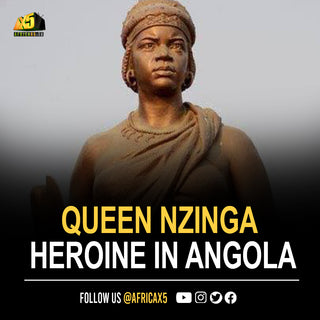
Queen Nzinga
Queen Nzinga (approximately 1583–1663) is honored as a national heroine in Angola for numerous significant reasons, stemming from her remarkable leadership, opposition to colonialism, and lasting impact. Her life and deeds have established her as a powerful emblem of strength, resilience, and national pride. Nzinga is primarily recognized for her staunch opposition to Portuguese colonization. During a period when the Portuguese were aggressively expanding their influence and exploiting African resources and populations, Nzinga emerged as a formidable opponent. Her capacity to lead extended military campaigns and utilize guerrilla warfare effectively disrupted Portuguese attempts to control the area. Her resistance stands as a potent symbol of defiance and bravery in the face of foreign domination.
Nzinga's diplomatic skills were extraordinary, matching her military expertise. She adeptly negotiated treaties and formed alliances to safeguard her people and uphold her kingdom's independence. Her famous negotiation with the Portuguese governor, using a servant as a human chair to assert her equal status, exemplifies her strategic thinking and determination to maintain her dignity and authority. Nzinga's diplomacy enabled her to navigate intricate political landscapes, managing relationships with European powers and neighboring African states.
As a ruler, Nzinga displayed exceptional leadership and statecraft. Upon ascending the throne of Ndongo and later Matamba, she turned her kingdom into a formidable and resilient state. She reorganized her armies, fortified her territories, and ensured the well-being of her people. Nzinga's capacity to lead and motivate her subjects during times of war and peace underscores her effectiveness as a leader.
Nzinga tirelessly advocated for the freedom and well-being of her people, vehemently opposing the transatlantic slave trade and working to prevent their enslavement. Her dedication to protecting her subjects from exploitation and slavery showcases her compassion and unwavering commitment to justice.
Nzinga's cultural and national legacy in Angola is profound, leaving a lasting impact on the country's identity. She is revered in Angolan folklore, literature, and history as a symbol of resistance and resilience. Her story is integrated into educational curricula and commemorated in national events, serving as a source of inspiration for future generations.
Nzinga's life embodies the enduring spirit of the Angolan people in their struggle for independence and self-determination. Nzinga's prominence as a formidable female leader during a time when society was predominantly male positions her as a significant advocate for gender empowerment. Her effective reign and military prowess challenge conventional gender norms, demonstrating that women are capable of leading and influencing historical narratives. Nzinga's legacy continues to motivate women in Angola and beyond to seek leadership roles and confront injustice.
Queen Nzinga stands as a heroine in Angola due to her remarkable resistance against Portuguese colonization, her outstanding diplomatic and military abilities, her empathetic leadership, and her profound influence on the nation's cultural and historical identity. Nzinga's life and legacy embody the strength, resilience, and enduring spirit of the Angolan people, establishing her as a venerated and inspirational figure in the annals of the country's history

